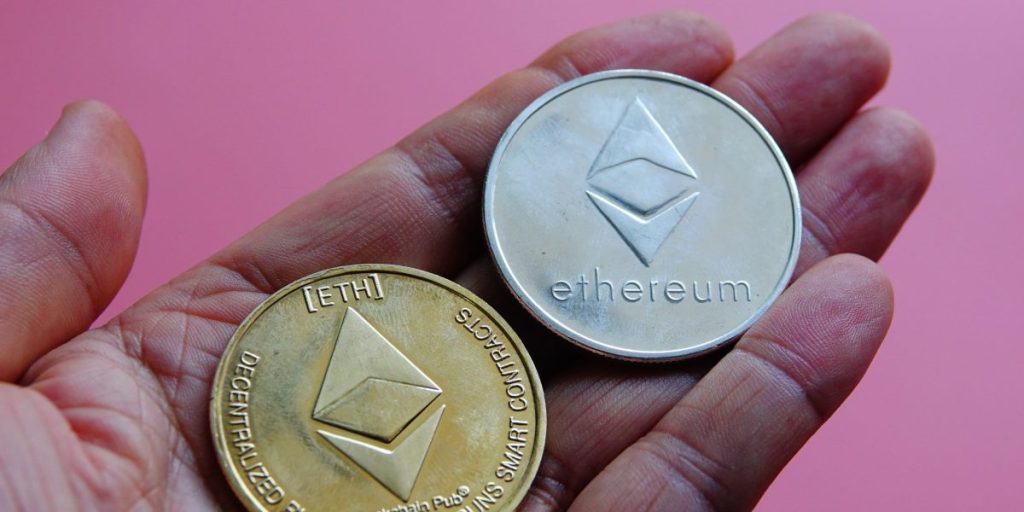New Spot Ethereum ETFThe fund, which allows investors to buy the second-most popular cryptocurrency in the form of shares, is set to begin trading on Tuesday, July 23. The Securities and Exchange Commission has approved at least three funds to enter the market on that date, sources said. Said ReutersHowever, a total of eight Ethereum ETFs are believed to be launched simultaneously.
These products follow in the footsteps of 11 spot Bitcoin ETFs, which have amassed more than $54 billion in assets under management since their launch in January and have helped Bitcoin surge 47% this year.Here’s everything you need to know about their Ethereum equivalents.
What is a Spot Ethereum ETF?
Ether is the native cryptocurrency of the Ethereum blockchain. reservationEther is legally considered a commodity, but its corresponding ETF is a security.
ETFs first appeared on the market in 1993. The funds pool a basket of securities, such as several different energy stocks, and their price tracks the index they track. ETFs act like stocks because they are listed on an exchange and can be traded during market hours.
The Spot Ether ETF tracks the spot, or current, price of Ether. The product allows investors to access the underlying cryptocurrency without owning a cryptocurrency wallet. The ETF is set up as a grantor trust, meaning investors will own a portion of the Ether held by the trust.
Who issues it and what are the fees?
Eight asset managers are proposing to offer Ethereum ETFs. Black RockARK Invest/21Shares, VanEck, Grayscale, Fidelity, Bitwise, Franklin Templeton, and Invesco/Galaxy Digital. Since each product is nearly identical, the fees charged to investors will be competitive. What we know so far is that Franklin Templeton will charge 0.19%, VanEck will charge 0.20%, and Invesco and Galaxy Digital will charge 0.25% for their jointly filed ETFs.
The full list of fees will be revealed when the final registration statement (S-1) is filed with the SEC, which is due on Tuesday if all eight stocks begin trading.
Where can I access it?
these are, NasdaqChicago Board Options Exchange (CBOE), and New York Stock Exchange.
Why buy an Ethereum ETF?
Bitcoin and Ether tokens represent units of ownership, or value, on the underlying blockchain. Beyond I mean, they’re very different.
While Bitcoin may be a long-term hedge against inflation, Ethereum is more of a technology investment. Blockchain’s main premise is to “eliminate middlemen and enable 24/7 operation of financial services like trading and lending, tokenization, digital collectibles, and digital identity,” said Vetul Lunde, senior analyst at K33 Research. luck.
He added that while crypto markets are highly correlated at the moment, that wasn’t always the case, so an Ethereum ETF would allow investors to diversify in which sectors of the crypto economy they want to invest in.
Will their popularity rival that of spot Bitcoin ETFs?
Bloomberg ETF analyst James Seifert said demand for the fund will be 20% of the demand for a spot Bitcoin ETF. luckThe prediction comes as Ether’s market capitalization is roughly one-third that of Bitcoin. Moreover, he says ETFs lack the key benefits of holding Ether. Investors are Stakegenerating yield. But even at this modest scale, it will be “very successful” by ETF launch standards, Seifert said. Similarly, K33 Research projects inflows of $4 billion in the first six months of trading, a quarter of what a physical Bitcoin ETF would bring in.
Leah Wald, CEO and president of Cyberpunk Holdings, said that when judging success, it’s important to evaluate performance six months after trading, not just “game day” or the first few weeks. luckThese summer launches will hit the market at a time when trading is typically “calmer,” she noted, adding that success should be judged not just by inflows but also by volume and spreads, as the health of these metrics will drive future AUM growth and investors will feel comfortable allocating capital to these new securities.
Who will invest in them?
Institutional investors such as hedge funds, pension funds, banks and endowments. Retail investors also access these investors, either by buying directly or through portfolio allocation via wealth advisors. The latter group is likely to dominate trading in the first six months. Q1 13Fs The Spot Bitcoin ETF revealed that over 80% of its total assets under management are from non-professional investors.
How will ETFs impact the cryptocurrency market?
If K33’s prediction of $4 billion in inflows over six months is accurate, then at current prices, 1% of Ethereum in circulation would be absorbed into the ETF by the end of the year. This absorption would be “well positioned” to boost Ethereum prices later this year, Lunde said.
History suggests that inflows will also be bullish for the overall market. According to K33, new funds flowing into Bitcoin through ETFs boosted the cryptocurrency’s market capitalization by 46% in 2024. Lunde expects that the product will allow funds that have stayed away from the market to enter the market, “further amplifying the overall market’s power.” Furthermore, he said, Bitcoin ETF investors “have proven to be able to handle volatility well, and inflows have been robust even during major corrections,” suggesting that ETFs can open the market to new investors committed to long-term investments.
Finally, the fact that traditional finance giant BlackRock is issuing one of the funds signals the firm’s deeper commitment to cryptocurrencies, which he says gives the industry a “solid and much-needed stamp of approval.”
CEO Daily provides essential context for the news business leaders need to know. Every weekday morning, more than 125,000 readers rely on CEO Daily for executive insights and insider insights from the C-suite. Subscribe now.


